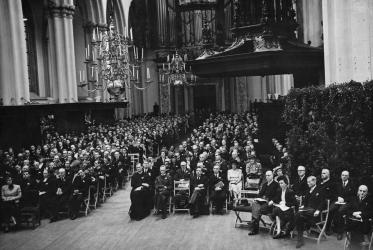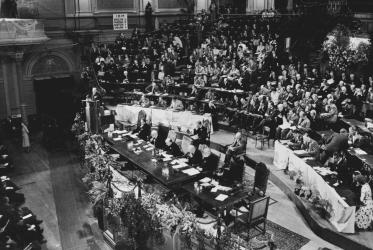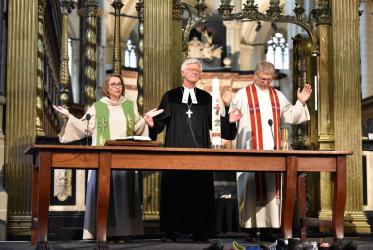Frères de la remonstrance
(De Remonstrantse Broederschap)
An indigenous type of Protestantism existed in the Netherlands before Calvinism was introduced from France and the Reformed Church was born in 1568. The latter sought to impose a system of doctrines, against which the more liberal people from the older Protestant circles protested, and whose leader was Arminius. They presented a "remonstrance" to the States of Holland in 1610, in which they stated five articles characteristic of a free church. The Synod of Dordrecht (1618-19) expelled the Remonstrants (as they were called) and dismissed 200 ministers, many of whom were banished or imprisoned. These ministers formed themselves into a "brotherhood", a description later taken over by Remon-strant-Reformed congregations. From 1630, persecution slackened and churches were built. By 1860, the membership of the Brotherhood had fallen to 4,000, but then, as a result of the rise of religious modernism in terms of biblical criticism, modern science and philosophy, response to modern culture, and secularization, the Brotherhood with its evangelical freedom began to appeal to many. Membership increased five-fold. In recent years it has somewhat decreased again. One congregation has been located since 1621 in Friedrichstadt a/d Eider in Schleswig-Holstein, Federal Republic of Germany.
The statement of principle of the church reads: "The Remonstrant Brotherhood is a community of faith which, rooted in the gospel of Jesus Christ and faithful to its principle of freedom and tolerance, seeks to worship and serve God". Most Remonstrants put a lot of emphasis on personal faith, on which they are by no means always in agreement with each other. What binds them together is the statement of principle. Though not directly engaged in mission work on its own, the Brotherhood shares in the work of the Netherlands Missionary Council. Conversations are in progress with the Protestant Church of the Netherlands on theological understanding and on cooperation between the two churches. The church is actively involved in dealing with the contemporary issues of society, mission and diakonia, and in the reflection on being the church of Jesus Christ in the world today.





